Your cart is currently empty!
Innovations in Data Center Cooling: What You Need to Know

Data centers are the backbone of the modern digital world, housing the servers and infrastructure needed to support the vast amount of data generated and processed every day. As data centers continue to grow in size and complexity, the challenge of keeping them cool becomes increasingly important. Cooling accounts for a significant portion of a data center’s energy consumption, making it a key focus for innovation and efficiency improvements.
In recent years, there have been significant advancements in data center cooling technology, aimed at reducing energy consumption, improving efficiency, and reducing environmental impact. These innovations have the potential to not only reduce operating costs for data center operators but also contribute to the overall sustainability of the industry.
One of the most promising innovations in data center cooling is the use of liquid cooling technology. Liquid cooling systems use water or other coolants to remove heat from servers and other equipment, offering a more efficient and effective method of cooling compared to traditional air-based systems. Liquid cooling can significantly reduce energy consumption and improve cooling efficiency, leading to lower operating costs and a smaller environmental footprint.
Another key innovation in data center cooling is the use of modular cooling systems. These systems are designed to be easily scalable and customizable, allowing data center operators to adapt their cooling infrastructure to meet changing demands and requirements. Modular cooling systems can be more efficient and cost-effective than traditional cooling solutions, offering flexibility and scalability for data center operators.
Additionally, advancements in artificial intelligence and machine learning have enabled more intelligent and predictive cooling systems. These systems can analyze real-time data on server temperatures, workload demands, and environmental conditions to optimize cooling performance and energy efficiency. By dynamically adjusting cooling systems based on changing conditions, AI-powered cooling systems can reduce energy consumption and improve overall efficiency.
Overall, the innovations in data center cooling are driving significant improvements in energy efficiency, cost savings, and environmental sustainability. As data centers continue to grow in size and complexity, it is essential for operators to stay informed about the latest developments in cooling technology and consider implementing these innovations to optimize their operations. By leveraging cutting-edge cooling solutions, data center operators can reduce their environmental impact and improve the overall performance and reliability of their facilities.

Leave a Reply